- Home
- James Clavell
Whirlwind Page 36
Whirlwind Read online
Page 36
“We’re, er, happy to be here.” Ross covered his embarrassment at the open compliment. “Agha,” he called out to the guide, “please join us at food.”
“Thank you, Agha, but I am not hungry,” the old man replied without moving from the cave mouth.
Rosemont put his boots back on. “You got a lot of special units in Iran?”
“No. Half a dozen—we’re here training Iranians. You think Bakhtiar will weather it?” He opened his pack and distributed the cans of bully beef.
“No. The word in the hills among the tribes is that he’ll be out—probably shot—within the week.”
Ross whistled. “Bad as that?”
“Worse: that Azerbaijan’ll be a Soviet protectorate within the year.”
“Bloody hell!”
“Sure. But you never know”—Vien smiled—“that’s what makes life interesting.”
Casually Ross offered the flask. “Best Iranian rotgut money can buy.”
Rosemont grimaced and took a careful sip, then beamed. “Jesus H. Christ, it’s real Scotch!” He prepared to take a real swallow but Ross was ready and he grabbed the flask back.
“Easy does it—it’s all we’ve got, Agha.”
Rosemont grinned. They ate quickly. The cave was snug and safe. “You ever been to Vietnam?” Rosemont asked, wanting to talk, feeling the time right.
“No, never have. Almost went there once when my father and I were en route to Hong Kong but we were diverted to Bangkok from Saigon.”
“With the Gurkhas?”
“No, this was years ago, though we do have a battalion there now. I was,” Ross thought a moment, “I was seven or eight, my father has some vague Hong Kong relations, Dunross, yes that was their name, and there was some sort of clan gathering. I don’t remember much of Hong Kong except a leper who lay in the dirt by the ferry terminal. I had to pass him every day—almost every day.”
“My dad was in Hong Kong in ’63,” Vien said proudly. “He was deputy director of station—CIA.” He picked up a stone, toyed with it. “You know I’m half-Vietnamese?”
“Yes, they told me.”
“What else did they tell you?”
“Just that I could trust you with my life.”
Rosemont smiled wryly. “Let’s hope they’re right.” Thoughtfully he began checking the action of his M16. “I’ve always wanted to visit Vietnam. My pa, my real pa, was Vietnamese, a planter, but he was killed just before I was born—that was when the French owned Indochina. He got clobbered by Viet Cong just outside Dien Bien Phu. Ma…” The sadness dropped off him and he smiled. “Ma’s as American as a Big Mac and when she remarried she picked one of the greatest. No real pa could’ve loved me more…”
Abruptly Gueng cocked his carbine. “Sahib!” Ross and Rosemont grabbed their weapons, then there was a keening on the wind, Ross and Gueng relaxed. “It’s Tenzing.”
The sergeant appeared out of the night as silently as he had left. But now his face was grim. “Sahib, many trucks on the road below—”
“In English, Tenzing.”
“Yes, sahib. Many trucks, I counted eleven, in convoy, on the road at the bottom of the valley…”
Rosemont cursed. “That road leads to Mecca. How far away were they?”
The little man shrugged. “At the bottom of the valley. I went the other side of the ridge and there’s a…” He said the Gurkhali word and Ross gave him the English equivalent. “A promontory. The road in the valley twists, then snakes as it climbs. If the tail of the snake is in the valley and the head wherever the road ends, then four trucks were already well past tail.”
Rosemont cursed again. “An hour at best. We’d bett—” At that moment there was a slight scuffle and their attention flashed to the cave mouth. They just had time to see the guide rushing away, Gueng in pursuit.
“What the hell…”
“For whatever reason, he’s abandoning ship,” Ross said. “Forget him. Does an hour give us a chance?”
“Sure. Plenty.” Quickly they got into their packs and Rosemont armed his light machine gun. “What about Gueng?”
“He’ll catch us up.”
“We’ll go straight in. I’ll go first—if I run into trouble you abort. Okay?”
The cold was almost a physical barrier they had to fight through but Rosemont led the way well, the snow not bad on the meandering path, the moon helping, their climbing boots giving them good traction. Quickly they topped the ridge and headed down the other side. Here it was more slippery, the mountainside barren, just a few clumps of weeds and plants fighting to get above the snow. Ahead now was the maw of the cave, the road running into it, many vehicle tracks in the snow.
“They could’ve been made by our trucks,” Rosemont said, covering his disquiet. “There’s been no snow for a couple of weeks.” He motioned the others to wait and went forward, then stepped out on the road and ran for the entrance. Tenzing followed, using the ground for cover, moving as rapidly.
Ross saw Rosemont disappear into the darkness. Then Tenzing. His anxiety increased. From where he was he could not see far down the road, for it curled away, falling steeply. The strong moonlight made the crags and the wide valley more ominous, and he felt naked and lonely and hated the waiting. But he was confident. “If you’ve Gurkhas with you, you’ve always a chance, my son,” his father had said. “Guard them—they’ll always guard you. And never forget, with luck, one day you’ll be Sheng’khan.” Ross had smiled to himself, so proud, the title given so rarely: only to one who had brought honor to the regiment, who had scaled a worthy Nepalese peak alone, who had used the kookri and had saved the life of a Ghurkha in the service of the Great Raj. His grandfather, Captain Kirk Ross, MC, killed in 1915 at the Battle of the Somme, had been given it posthumously; his father, Lieutenant Colonel Gavin Ross, DSO, was given it in Burma, in 1943. And me? Well, I’ve scaled a worthy peak—K4—and that’s all so far but I’ve lots of time…
His fine-tuned senses warned him and he had his kookri out, but it was only Gueng. The little man was standing over him, breathing hard. “Not fast enough, sahib,” he whispered happily in Gurkhali. “I could have taken you moments ago.” He held up the severed head and beamed. “I bring you a gift.”
It was the first that Ross had seen. The eyes were open. Terror still contorted the face of the old man. Gueng killed him but I gave the order, he thought, sickened. Was he just an old man who was scared fartless and wanted to get out while the going was good? Or was he a spy or a traitor rushing to betray us to the enemy?
“What is it, sahib?” Gueng whispered, his brow furrowed.
“Nothing. Put the head down.”
Gueng tossed it aside. The head rolled a little down the slope then stopped. “I searched him, sahib, and found this.” He handed him the amulet. “It was around his throat and this”—he gave him the small leather bag—“this hung down around his balls.”
The amulet was just a cheap blue stone worn against the evil eye. Inside the little bag was a small card, wrapped in plastic. Ross squinted at it and his heart skipped a beat. At that moment there was another keening on the wind, the note different. Immediately they picked up their guns and ran for the cave mouth, knowing that Tenzing had given them the all-clear signal and to hurry. Inside the throat of the cavern the darkness seemed deeper and then, as their eyes adjusted, they saw a fleck of light. It was a flashlight, the lens partially covered.
“Over here, Captain.” Though it was softly said, Rosemont’s voice echoed loudly. “This way.” He led them farther into the cave and when he was sure it was safe he shone the light on the rock walls and all around to get his bearings. “It’s okay to use your flashes.” The cave was immense, many tunnels and passages leading off it, some natural, some man-made, the rock dome fifty feet overhead. “This’s the unloading area,” he said. When he found the tunnel he sought he shone the light down it. At the end was a thick steel door, half open. “It should be locked,” he whispered, his voice raw. “I don’t know
if it was left like that or what, but that’s where we have to go.”
Ross motioned to Tenzing. At once the kookri came out and the soldier went forward to vanish inside. Automatically Ross and Gueng took up defensive positions. Against whom? Ross asked himself helplessly, feeling trapped. There could be fifty men hidden in any one of those other tunnels.
The seconds dragged. Again there was the keening. Ross led the rush through the doorway, then Gueng, then Rosemont. As Rosemont passed the door he saw that Tenzing had taken up a position nearby and was covering them. He pulled the door to and switched on the lights. The suddenness made the others gasp.
“Hallelujah!” Rosemont said, openly relieved. “The brass figured if the generators were still working, we’d have a good shot. This door’s lightproof.” He slid heavy bolts into place, hung his flashlight on his belt.
They were in another cave, much smaller, that had been adapted, the floor leveled and carpeted roughly, the walls made more flat. It was a form of anteroom with desks and phones and litter everywhere. “The guys sure didn’t waste any time getting the hell out, did they?” he said bitterly, hurrying across the room to another tunnel, down it and into another cave room with more desks, a few radar screens, and more phones, gray and green.
“The grays’re internal, greens go to the tower and masts on the crest, from there by satellite to Tehran, our HQ switchboard in the embassy, and various top secret places—they’ve built-in scramblers.” Rosemont picked one up. It was dead. “Maybe the communications guys did their job after all.” At the far end of the room was a tunnel. “That goes down to the generator room for this section which has all the gear we’ve to blow. Living quarters, kitchens, mess halls, repair shops, are in other caves off the unloading area. About eighty guys worked here around the clock.”
“Is there any other way out of here?” Ross asked. His feeling of being closed in was greater than ever.
“Sure, topside, where we’re going.”
Rough steps led upward through the domed roof. Rosemont started climbing them. On the landing was a door: TOP SECURITY AREA—NO ADMITTANCE WITHOUT SPECIAL AUTHORITY. It too was open. “Shit,” he muttered. This cave was well-appointed, floor flatter, walls whitewashed. Dozens of computers and radar screens, and banked electronic equipment. More desks and chairs and phones, gray and green. And two red on a central desk.
“What’re those for?”
“Direct to Langley by military satellite.” Rosemont picked one up. It was dead. So was the other. He pulled out a piece of paper and checked it, then went over to a bank of switches and turned some on. Another obscenity as a soft hum began, computers started chattering, warming up, and three of the radar screens came to life, the central white trace-line turning, leaving a scatter pattern in its wake. “Bastards! Bastards to leave everything like this.” His finger stabbed at four corner computers. “Blow those mothers—they’re the core.”
“Gueng!”
“Yes, sahib.” The Gurkha took off his pack and began to lay out the plastic explosives and detonators.
“Half-hour fuses?” Rosemont said.
“Half-hour fuses it is.” Ross was staring at one of the screens, fascinated. Northward he could see most of the Caucasus, all of the Caspian, eastward even part of the Black Sea, all with extraordinary clarity, “That’s a lot of space to peer into.”
Rosemont went over to its keyboard and turned a switch.
For a moment Ross was dumbfounded. He tore his eyes off the screen. “Now I understand why we’re here.”
“That’s only part.”
“Christ! Then we’d better get cracking. What about the cave mouth?”
“We’ve no time to do a decent job—and the other side of our door’s routine junk they’ve stolen anyways. We’ll blow our tunnels after us and use the escapeway.”
“Where’s that?”
The American went over to a door. This one was locked. He took out a bunch of tagged keys and found the one he wanted. The door swung open. Behind the door a narrow flight of stairs spiraled upward steeply. “It leads out onto the mountain.”
“Tenzing, make sure the way’s clear.” Tenzing went up the stairs two at a time. “Next?”
“Code room and the safes, we’ll mine those. Then communications. Generator room last, okay?”
“Yes.” Ross liked the incisive strength more and more. “Before we do you’d better look at this.” He took out the small, plastic-covered card. “Gueng caught up with our guide. This was on him.”
All color left Rosemont’s face. On the card was a thumbprint, some writing in Russian script, and a signature. “An ID!” he burst out. “A Commie ID!” Behind them Gueng paused momentarily.
“That’s what I thought. What’s it say exactly?”
“I don’t know, I can’t read Russian either but I’ll bet my life it’s a safe-conduct pass.” A wave of sickness came up from his stomach as he remembered all the days and nights he had spent in the old man’s company, wandering the mountains, sleeping alongside him in the open, feeling very safe. And all the time he’d been pegged. Numbly he shook his head. “Meshgi was with us for years—he was one of Ali bin Hassan Karakose’s band—Ali’s an underground leader and one of our best contacts in the mountains. Great guy who even operates as far north as Baku. Jesus, maybe he’s been betrayed.” He looked at the card again. “Just doesn’t figure.”
“I think it figures we could have been deliberately set up, sitting ducks,” Ross said. “Perhaps the convoy’s part of it, full of troops to track us. We’d better hurry it up, eh?”
Rosemont nodded, fighting to dominate the fear that swept through him, helped by the calmness of the other man. “Yes, yes, you’re right.” Still shattered, he went through a small passage to another door. Locked. As he looked for the key on the tabbed ring of keys he said, “I owe you and your men an apology. I don’t know how we—I—got taken in or how that bastard escaped the security check but he did and you’re probably right—we’re set up. Sorry, but, shit, that doesn’t help a goddamn bit.”
“It helps.” Ross grinned and the fear dropped off both of them. “It helps. Okay?”
“Okay. Thanks, yes, thanks. Gueng killed him?”
“Well,” Ross said dryly. “He handed me his head. They usually just bring back ears.”
“Jesus. You been with them long?”
“The Gurkhas? Four years.”
The key slid into the lock and the door opened. The code room was pedantically neat. Telex and teleprinter and copy machines. A curious computer printer with a keyboard was on its own desk. “That’s the decoder—worth any money you’d like to ask the opposition.” On the desks pencils were lined up. Half a dozen manuals.
Rosemont picked them up. “Good sweet Jesus…” All were codebooks marked MECCA—ONE COPY ONLY. “Well, at least the master code’s locked up.” He went to the modern safe with its electronic, 0-9 digital lock that was set into one wall, read the combination from his piece of paper and touched the digits. But the Open light didn’t come on. “Maybe I missed a number. Read them to me, okay?”
“Sure.” Ross began reading out the long series of numbers. Behind them Tenzing came in noiselessly. Neither man heard him. “…one twenty-five…seven twenty-one.” Then both men felt the presence at the same instant and whirled, momentarily panicked.
Tenzing kept the delight off his face and closed his ears to the profanity. Hadn’t the Sheng’khan told him to train the son and make him wise in the ways of stealth and killing? Hadn’t he sworn to guard him and be his silent teacher? “But, Tenzing, for the love of God don’t let my son know I told you to. Keep this secret between us…” It’s been very hard to catch the sahib unawares for weeks, he thought happily. But Gueng caught him tonight and so did I. Much better we do than an enemy—and now they surround us like bees and their queen.
“The staircase leads upward for seventy-five steps to an iron door,” Tenzing said in his best reporting voice. “The door is rusty but I fo
rced it. Outside is a cave, outside the cave is the night—a good escape route, sahib. Not good is that from there I saw the first of the convoy.” He paused, not wanting to be wrong. “Perhaps half an hour of time is left.”
“Go back to the first door, Tenzing, the one we barred. Mine the tunnel this side of the door to leave the door unharmed—twenty-minute fuse from now. Tell Gueng to set his fuses the same from now exactly. Tell Gueng what I’ve ordered.”
“Yes, sahib.”
Ross turned back. He noticed the sweat on Rosemont’s forehead. “Okay?”
“Sure. We got to one hundred three.”
“The last two numbers are six sixty and thirty-one.” He saw the American touch the numbers. The Open light began winking. Rosemont’s right hand went for the lever. “Hold it!” Ross wiped the sweat from his own chin, the golden stubble rasping. “I suppose there’s no chance it could be booby-trapped?”
Rosemont stared at him, then at the safe. “It’s possible. Sure, it’s possible.”
“Then let’s just blow the bugger and not risk it.”
“I—I’ve gotta check. I’ve got to check if Mecca’s master code’s inside or not. That and the decoder’re priority.” Again he looked at the light winking at him. “You go back in the other room, take cover with Gueng, shout when you’re ready. I—it’s my shot.”
Ross hesitated. Then he nodded, picked up both packs that contained explosives and detonators. “Where’s the communications room?”
“Next door.”
“Is—is the generator room important?”
“No. Just this one, the decoder and those four mothers back there, though it’d be best if this whole goddamn floor went to hell.” Rosemont watched Ross walk away then turned his back and looked back at the lever. There was a bad tightness in his chest. That sonofabitch Meshgi! I’d’ve bet my life—you did, we all did, even Ali Karakose. “You ready?” he called out impatiently.
“Wait!” Again his stomach surged. Ross was back beside him before he had heard him, in his hands a long, thin, nylon climbing rope that, quickly, he lashed to the lever. “Turn the lever when I say but don’t open the door. We’ll jerk it open from back there.” Ross hurried out. “Now!”

 Gai-Jin
Gai-Jin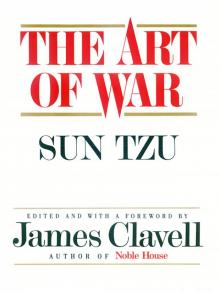 The Art of War
The Art of War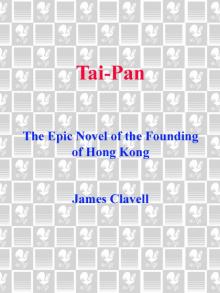 Tai-Pan
Tai-Pan Noble House
Noble House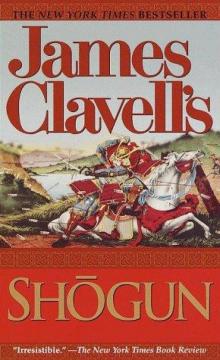 Shōgun
Shōgun Whirlwind
Whirlwind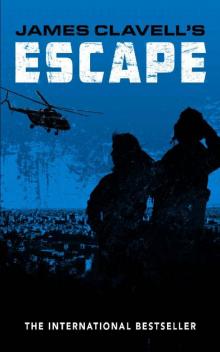 Escape
Escape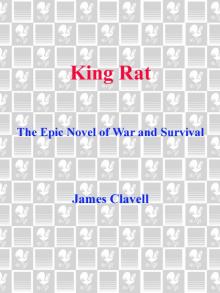 King Rat
King Rat The Children's Story
The Children's Story